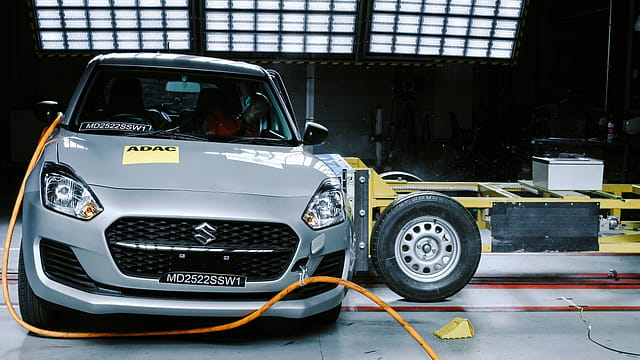Maruti Suzuki Swift, S-Presso, Ignis fail Global NCAP crash test
ADVERTISEMENT

India's largest carmaker, Maruti Suzuki India Ltd., fared poorly at the Global New Car Assessment Programme (Global NCAP) crash tests.
Maruti Suzuki's three models—Swift, Ignis and S-Presso—bagged one star each in the adult occupant protection category at the Global NCAP crash tests.
While Maruti's popular hatchback model Swift secured one star for child occupant protection, Maruti Suzuki S-Presso and Ignis scored zero stars for child occupant protection.
The three Maruti Suzuki models, the Swift, S-Presso and Ignis, were tested in their basic safety specification with two frontal airbags and ABS.
Global NCAP's updated protocols assess frontal and side impact protection for all tested models, Electronic Stability Control (ESC), pedestrian protection and side impact pole protection assessments are also required for vehicles scoring the highest star ratings.
"None of the three models provide ESC or side curtain airbags as standard or as optional equipment. All three models demonstrated unstable structures during frontal crash testing," says the crash testing body.
"It is of great concern that the manufacturer with the largest market share in India, Maruti Suzuki, still offers such poorly performing models, which don’t even make some key safety systems available to consumers in India as optional equipment," says Alejandro Furas, Secretary General of Global NCAP.
Meanwhile, the Mahindra Scorpio-N scored five stars for adult occupant protection and three stars for child occupant protection. The Mahindra Scorpio-N was tested in its basic safety specification fitted with two frontal airbags and ABS. Electronic Stability Control (ESC) and side curtain airbags are not standard however curtain airbags are standard in the majority of units produced. The lack of three point seatbelts affected the child occupant protection result, limiting it to only three stars, says Global NCAP.
"Indian manufacturers such as Mahindra have clearly demonstrated their ongoing commitment to improving vehicle safety performance. This is very welcome and we look forward to this promising momentum being maintained when Bharat NCAP is launched next year," says David Ward, executive president of the Towards Zero Foundation.
"It is again disappointing that Maruti Suzuki has failed to match the safety progress being made by their competitors. At least now Indian Government regulations are forcing the company to apply minimum safety standards. But surely they should care enough about their customers to do much better than that," Ward adds.
The second set of results complying with Global NCAP's new and more demanding crash test protocols were published in the #SaferCarsForIndia campaign on Monday, supported by the FIA Foundation and Bloomberg Philanthropies.
"The failure of all three tested Maruti Suzuki models to achieve a safe rating showcases a disregard for the safety of Indian drivers, passengers and road users alike. The #SaferCarsForIndia campaign has shown how quickly manufacturers can adapt to meet Global NCAP's safety standards and it is time for Maruti Suzuki to learn from other regional manufacturers like Mahindra," says Saul Billingsley, executive director of FIA Foundation.
Global NCAP is a programme of the Towards Zero Foundation, a U.K. based charity working internationally in support of the new UN Decade of Action for Road Safety, with a goal of halving road deaths and serious injuries by 2030.